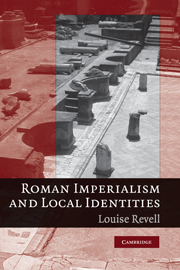4 - Addressing the Divine
Published online by Cambridge University Press: 18 December 2009
Summary
ROMAN RELIGION AS PRACTISE
The need for a more powerful entity or supreme being to provide some form of order to the essentially chaotic nature of human existence is a phenomenon which can be seen throughout much of the past, and this is no less true of the Roman empire. For a Roman, the gods were everywhere, powerful forces with an interest in all aspects of life. At Rome itself, the senate could only hold their regular meetings within a templum: an area formally designated as religious space by the augurs. Before each meeting, the auspices had to be taken to ascertain whether or not the gods were favourable; any business transacted without divine sanction could be declared invalid (Beard et al. 1998: 23). Religion and religious activity were a key part of the cultural changes within the western provinces, with the spread of Latin dedications to both Roman and indigenous deities pointing to the complexity of these changes. In spite of this, religion has been something of a neglected topic in the study of Romanization and the western province (Woolf 2000 for a fuller survey), and past approaches to the topic have tended to concentrate on the deities and the temples. Much of this work has been carried out within the framework of Romanization, whether explicit or implicit, but in this aspect, perhaps more than any other element of Romanization, the relationship between imperial and indigenous is complex and dynamic.
- Type
- Chapter
- Information
- Roman Imperialism and Local Identities , pp. 110 - 149Publisher: Cambridge University PressPrint publication year: 2008

